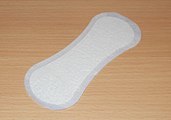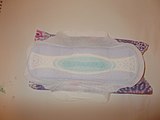
A tampon is a menstrual product designed to absorb blood and vaginal secretions by insertion into the vagina during menstruation. Unlike a pad, it is placed internally, inside of the vaginal canal. Once inserted correctly, a tampon is held in place by the vagina and expands as it soaks up menstrual blood. However, in addition to menstrual blood, the tampon also absorbs the vagina's natural lubrication and bacteria, which can change the normal pH, increasing the risk of infections from the bacterium Staphylococcus aureus, which can lead to toxic shock syndrome (TSS). TSS is a rare but life-threatening infection that requires immediate medical attention.

A menstrual pad, or simply a pad, is an absorbent item worn in the underwear when menstruating, bleeding after giving birth, recovering from gynecologic surgery, experiencing a miscarriage or abortion, or in any other situation where it is necessary to absorb a flow of blood from the vagina. A menstrual pad is a type of menstrual hygiene product that is worn externally, unlike tampons and menstrual cups, which are worn inside the vagina. Pads are generally changed by being stripped off the pants and panties, taking out the old pad, sticking the new one on the inside of the panties and pulling them back on. Pads are recommended to be changed every 3–4 hours to avoid certain bacteria that can fester in blood; this time also may differ depending on the kind worn, flow, and the time it is worn.
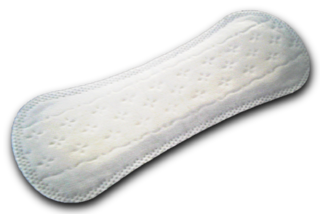
A pantyliner is an absorbent piece of material used for feminine hygiene. It is worn in the gusset of a woman's panties. Some uses include: absorbency for daily vaginal discharge, light menstrual flow, tampon and menstrual cup backup, spotting, post-intercourse discharge, and urinary incontinence. Panty liners can also help with girls who are having discharges and about to start their cycle. Pantyliners are related to sanitary napkins in their basic construction—but are usually much thinner and often narrower than pads. As a result, they absorb much less liquid than pads—making them suitable for light discharge and everyday cleanliness. They are generally unsuitable for menstruation with medium to heavy flow, which requires them to be changed more often.
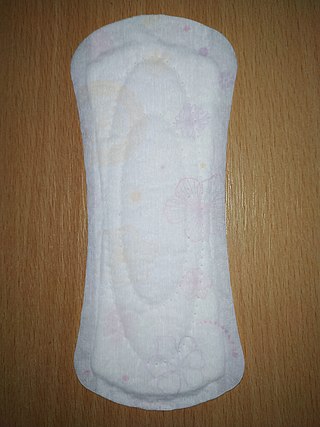
Kotex is an American brand of menstrual hygiene products, which includes the Kotex maxi, thin and ultra-thin pads, the Security tampons, and the Lightdays pantiliners. Most recently, the company has added U by Kotex to its menstrual hygiene product line. Kotex is owned and managed by Kimberly-Clark, a consumer products corporation active in more than 80 countries.

Feminine hygiene products are personal care products used for women's hygiene during menstruation, vaginal discharge, or other bodily functions related to the vulva and vagina. Products that are used during menstruation may also be called menstrual hygiene products, including menstrual pads, tampons, pantyliners, menstrual cups, menstrual sponges and period panties. Feminine hygiene products also include products meant to cleanse the vulva or vagina, such as douches, feminine wipes, and soap.

Cloth menstrual pads are cloth pads worn in the underwear to collect menstrual fluid. They are a type of reusable menstrual hygiene product, and are an alternative to sanitary napkins or to menstrual cups. Because they can be reused, they are generally less expensive than disposable pads over time, and reduce the amount of waste produced.

There are many cultural aspects surrounding how societies view menstruation. Different cultures view menstruation in different ways. The basis of many conduct norms and communication about menstruation in western industrial societies is the belief that menstruation should remain hidden. By contrast, in some indigenous hunter-gatherer societies, menstrual observances are viewed in a positive light, without any connotation of uncleanness. In most of India, menarche is celebrated as a rite of passage.
A papyrus sanitary pad, or Makapad, is a sanitary napkin made from papyrus, a natural material. It is reported to be 75 percent cheaper than a conventional menstrual pad and thus an advantage to the poor, as well as being highly absorbent. It is Africa's first hand-made menstrual hygiene product that is made completely with materials available locally, with its biggest production plant being in Kawempe. Makapad is an acronym used for menstruation, administration, knowledge, and affordability.

Lil-lets is a brand providing feminine hygiene products that operates principally in the UK, Ireland and South Africa. Since 2000, the company has restructured through two management buyouts (MBO) to become a business crossing all sectors of the feminine hygiene market, including tampons, sanitary napkins, pantyliners and intimate care. They also do programmes for schools that teach young girls the changes that occur when they begin to menstruate.

Arunachalam Muruganantham also known as Padman is a social entrepreneur from Coimbatore in Tamil Nadu, India. He is the inventor of a low-cost sanitary pad-making machine and is credited for innovating grassroots mechanisms for generating awareness about traditional unhygienic practices around menstruation in rural India. His mini-machines, which can manufacture sanitary pads for less than a third of the cost of commercial pads, have been installed in 23 of the 29 states of India in rural areas. He is currently planning to expand the production of these machines to 106 nations. The movie Period. End of Sentence. won the Academy Award for Best Documentary for the year 2018. The 2018 Hindi film Pad Man was made on his invention, where he was portrayed by Akshay Kumar.
Adema Sangale is a businesswoman, social entrepreneur and corporate executive in Kenya, who is the Managing Partner of C-Suite Africa, a business consultancy firm, based in Nairobi, the capital and largest city of Kenya. Her focus is advising locally owned businesses to transition from founder-managed to larger brand-driven, multi-country enterprises.
Women's Voices for the Earth (WVE) is a feminist, women-led, North American environmental organization that specializes in research and advocacy regarding toxic chemicals used in products that disproportionately impact women's health, including cosmetics, menstrual care products, professional salon and cleaning products. WVE is a non-profit organization whose mission is to amplify women's voices to eliminate toxics that harm communities and health. With its inclusive vision of environmental work WVE has become a hub for visionary feminist environmentalism that recognizes the systemic connections between health, class, race, and the environment. Addressing the inter-connectivity of these various channels of exposure to toxic chemicals has been key to WVE's approach which is multi-scalar: targeting consumer behaviors, corporate practices, and government policies.

Bella is a brand of feminine hygiene products, including maxi pads, ultra thin pads, and female wipes. Bella is currently owned by Polish company Toruńskie Zakłady Materiałów Opatrunkowych.

Tampon tax is a popular term used to call attention to tampons, and other feminine hygiene products, being subject to value-added tax (VAT) or sales tax, unlike the tax exemption status granted to other products considered basic necessities. Proponents of tax exemption argue that tampons, menstrual pads, menstrual cups and comparable products constitute basic, unavoidable necessities for women, and any additional taxes constitute a pink tax.
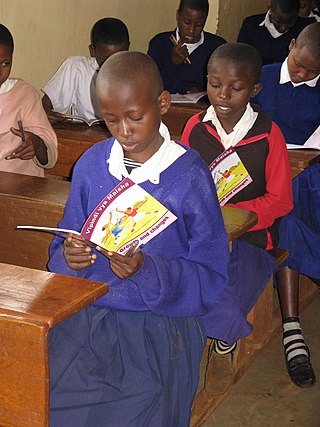
Menstrual hygiene management (MHM) or menstrual health and hygiene (MHH) refers to access to menstrual hygiene products to absorb or collect the flow of blood during menstruation, privacy to change the materials, and access to facilities to dispose of used menstrual management materials. It can also include the "broader systemic factors that link menstruation with health, well-being, gender equality, education, equity, empowerment, and rights". Menstrual hygiene management can be particularly challenging for girls and women in developing countries, where clean water and toilet facilities are often inadequate. Menstrual waste is largely ignored in schools in developing countries, despite it being a significant problem. Menstruation can be a barrier to education for many girls, as a lack of effective sanitary products restricts girls' involvement in educational and social activities.
Isobel Marshall is a South Australian social entrepreneur and medical student who was named Young Australian of the Year for 2021.
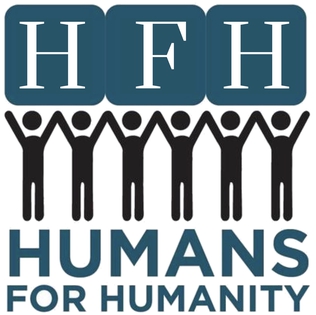
Humans For Humanity (HFH) is a non-governmental organization, founded by renowned social worker Anurag Chauhan, headquartered in Dehradun, India. It is working to bring awareness about menstrual health, hygiene among women across India. It is providing health, hygiene and comfort to women, especially in poverty-stricken and rural areas in India. The organization empowers women by educating women and young girls on menstruation and menstrual hygiene, and by conducting workshops to produce low-cost sanitary pads. The WASH project started by Humans For Humanity has reached over 3 million women in over 6 states in India in the last 6 years, as of October 2020.

Period underwear are absorbent garments designed to be worn during menstruation. Period underwear is designed like conventional underwear but it is made up of highly absorbent fabrics to soak up menstrual blood. Most commercially manufactured period underwear makes use of microfiber polyester fabric. It is recommended that period underwear should be changed every 8-12 hours to avoid leakage and infection.
Eco Femme is a women-led social enterprise in Tamil Nadu, India, that produces organic washable cloth pads. Eco Femme was founded in 2009 in Auroville by Kathy Walkling and Jessamijn Miedema who started by producing, applying and selling these washable menstrual pads in Auroville. The aim was to produce pads that are both affordable and free of plastic. They were also interested in designing a sustainable alternative to disposable pads for the women of India as well as setting up self sustaining initiatives in cloth pad production for women from the neighbouring villages. All commercially sold pads are organically certified under GOTS and Eco Femme is the first in this space to have achieved this certification. The cloth pads are mostly made out of organic cotton and can last up to 75 washes or for three to five years from the time of purchasing. These pads are sold in more than 20 countries across the world. By 2022, Eco Femme has distributed over 1 million cloth pads which consequently saved more than 75 million single use disposable pads from reaching landfills.

Period poverty is a term used to describe a lack of access to proper menstrual products and the education needed to use them effectively. In total, there are around 500 million women and girls that cannot manage their periods safely due to lack of menstrual products and for fear of shame. The American Medical Women's Association defines period poverty as "the inadequate access to menstrual hygiene tools and educations, including but not limited to sanitary products, washing facilities, and waste management". The lack of access to menstrual hygiene products can cause physical health problems, such as infections and reproductive tract complications, and can have negative social and psychological consequences, including missed school or work days and stigma.






